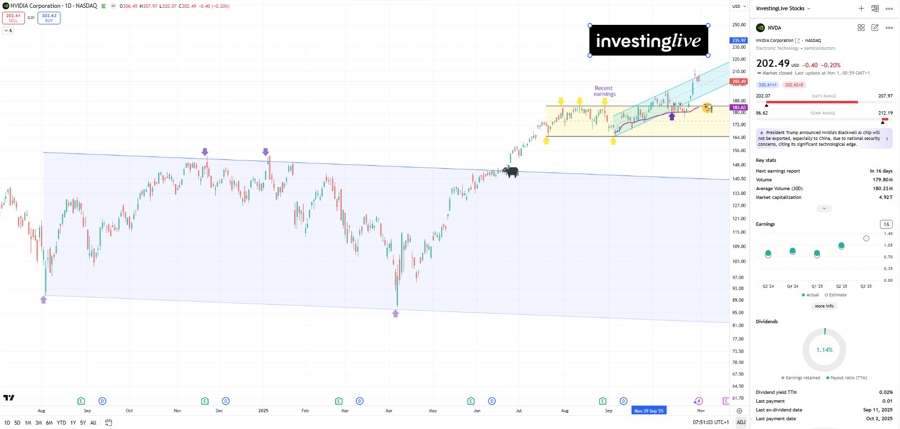Top Stories
Federal Reserve Chair Powell Declares No AI Bubble Amid Boom

UPDATE: Federal Reserve Chair Jerome Powell has just clarified that the current surge in artificial intelligence (AI) spending is not reminiscent of the infamous dot-com bubble. In a revealing statement, Powell highlighted that today’s AI leaders, including Microsoft, Alphabet, Amazon, Nvidia, and Meta, are generating substantial earnings and cash flow.
This urgent announcement comes as discussions about the sustainability of AI investments intensify. Powell emphasized that unlike the speculative startups of the 1990s, the companies driving today’s AI revolution are profitable and well-capitalized. His comments challenge the notion that AI spending is overinflated.
Why this matters now: Businesses are facing unprecedented productivity boosts due to AI, with consulting firm McKinsey estimating that generative AI could contribute several trillion dollars to the global economy annually. AI tools are already showing productivity gains exceeding ten percent, particularly among newer employees in various sectors.
In a recent interview with Finance Magnates, Itai Levitan, Head of Strategy at investingLive, asserted that AI is driving one of the largest productivity shifts in modern history. This productivity surge is more significant than any seen before, making AI a pivotal area for investment.
OpenAI is reportedly generating around $13 billion annually, supported by an estimated 30 to 40 million paying users. Furthermore, Google’s Gemini app has rapidly gained traction, now used by hundreds of millions worldwide.
However, despite these promising figures, some analysts warn that not all AI projects guarantee consistent returns. Companies adopting AI technologies are still navigating challenges in translating these innovations into measurable profits. This highlights the ongoing risks within the AI sector, reminding investors that careful evaluation is essential.
Powell’s insights resonate with many experts who believe that the major AI firms have a more sustainable business model compared to past speculative ventures. Nevertheless, the potential for selective overheating in less proven AI segments remains a concern.
Investors are advised to differentiate between AI spending that generates immediate value and those relying on future returns. Chipmakers, cloud providers, and AI infrastructure suppliers are already capitalizing on their investments, while smaller application developers may continue to require time to establish their economic viability.
As the debate over AI investments heats up, market dynamics are crucial. Notably, price points like $200 for shares of Nvidia often attract significant attention, influencing market behavior. Long-term investors must consider these psychological price levels when making decisions.
In conclusion, while Powell’s remarks suggest that there is unlikely to be a widespread AI bubble, timing remains critical for investment decisions. Nvidia’s stock could fluctuate to around $194 or even $187, based on current trends, emphasizing that entry timing is vital for achieving favorable portfolio results.
Do you believe there is an AI bubble forming, or are these investments justified by long-term productivity? Share your thoughts in the comments below, as this conversation continues to evolve rapidly.
-

 Science2 weeks ago
Science2 weeks agoInventor Achieves Breakthrough with 2 Billion FPS Laser Video
-

 Top Stories3 weeks ago
Top Stories3 weeks agoCharlie Sheen’s New Romance: ‘Glowing’ with Younger Partner
-

 Business3 weeks ago
Business3 weeks agoTyler Technologies Set to Reveal Q3 Earnings on October 22
-

 Entertainment3 weeks ago
Entertainment3 weeks agoDua Lipa Aces GCSE Spanish, Sparks Super Bowl Buzz with Fans
-

 Health3 weeks ago
Health3 weeks agoCommunity Unites for 7th Annual Into the Light Walk for Mental Health
-

 World3 weeks ago
World3 weeks agoR&B Icon D’Angelo Dies at 51, Leaving Lasting Legacy
-

 Health3 weeks ago
Health3 weeks agoCurium Group, PeptiDream, and PDRadiopharma Launch Key Cancer Trial
-

 Entertainment3 weeks ago
Entertainment3 weeks agoRed Sox’s Bregman to Become Free Agent; Tigers Commit to Skubal
-

 Entertainment3 weeks ago
Entertainment3 weeks agoMother Fights to Reunite with Children After Kidnapping in New Drama
-

 Health3 weeks ago
Health3 weeks agoNorth Carolina’s Biotech Boom: Billions in New Investments
-

 Science3 weeks ago
Science3 weeks agoNorth Carolina’s Biotech Boom: Billions Invested in Manufacturing
-

 Top Stories3 weeks ago
Top Stories3 weeks agoDisney+ Launches Chilling Classic ‘Something Wicked’ Just in Time for October









